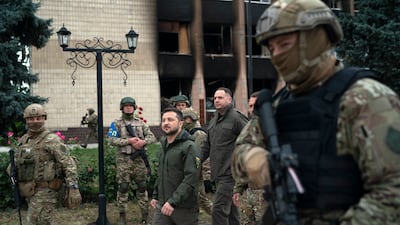After Ukrainian forces liberated vast swathes of territory around the northern region of Kharkiv in recent days, it is tempting to believe that the tide of the war has finally turned in Kyiv's favour. Indeed, for the first time since Russia launched its so-called "special military operation" against its southern neighbour in February, the Ukraine military now finds itself on the offensive.
Previously, Kyiv's involvement in the conflict had been primarily defensive in nature, with the main objective of its forces to thwart Moscow's attempt to overrun the country and replace the government of President Volodymyr Zelenskyy. The Ukrainian forces' most notable achievement in the conflict to date had been to prevent Russia's assault on the capital in the early stages, which ultimately resulted in the chaotic withdrawal of Russian forces.
Since then, Ukraine's primary objective has been to prevent Russia from making further significant gains in the east and south of the country, a tactic that has succeeded in halting the speed of the Russian advance. In the meantime, the Ukrainian government has been waging a highly effective public relations campaign aimed at persuading major western powers, such as the US and the UK, to provide it with the weaponry it requires to defeat Russia on the battlefield.
It is no surprise, therefore, that the recent revival in its fortunes has coincided with the arrival of sophisticated western weaponry, such as the long-range US Himar missile systems that have enabled it to strike deep into Russian-controlled territory. The new weaponry has been particularly helpful in helping Ukraine to pressure Russian forces occupying the key southern city of Kherson.
The belated arrival of the weaponry has now enabled the Ukrainians to launch their most ambitious military operation of the war – a surprise offensive in the north-east in recent days. After breaking through Russian defences at the end of last week, the rapid Ukrainian offensive has resulted in the recapture of almost 5,000 square kilometres of territory, equal in size to the Mediterranean island of Crete.
Some 150,000 Ukrainians have been freed from Russian occupation, which has also resulted in Kyiv retaking some 20 towns and villages around Kharkiv.
Despite Moscow insisting that its forces had withdrawn from the region to "regroup", there is little doubt that it has suffered its biggest defeat in the six-month conflict, with thousands of soldiers being forced to retreat in the face of the swift Ukrainian advance, abandoning large stockpiles of weapons as they did so.
Of particular significance has been the Ukrainians' capture of the towns of Kupyansk and Izyum, which were previously the main supply and transportation hubs for Russian forces operating in the area. Their capture means that thousands of troops now find themselves cut off from their supply lines.
Mr Zelenskyy celebrated Ukraine's success this week by making a personal visit to Izyum, where "he thanked the soldiers for liberating Ukrainian lands", according to the Facebook page of the 25th Separate Airborne Sicheslav Brigade.
The main task for them now is to undertake what Mr Zelenskyy described as "stabilisation measures" across the recaptured territory, including rounding up those who were complicit in the invasion. "Remnants of occupiers and sabotage groups are being detected, collaborators are being detained and full security is being restored," he said in an evening television broadcast.
The scale of the victory will provide an enormous boost to Ukraine's forces, which have been suffering significant casualties in recent weeks. It also demonstrates that, with the right equipment, they are more than capable of holding their own on the battlefield.
Their success owes much to the clever diversionary tactics employed by their commanders to confuse their Russian adversaries. Throughout much of the summer, Kyiv gave the impression that its primary focus was to liberate Kherson, the gateway to the Crimean Peninsula, captured by Russia in the early stages of the conflict.
Indeed, for the past month or so, the Ukrainians have been pounding Russian positions around Kherson to disrupt their ability to resupply their forces based in the city. Moreover, fearing a major Ukrainian assault, the Russians redeployed vital forces from the north and east of the country to the south, thereby weakening their defences. This enabled the Ukrainians to launch their lightning strike against poorly defended positions in the north-east.
But while Ukraine has every right to celebrate this significant victory, even Mr Zelenskyy understands that it is far too early to say whether it will ultimately have any bearing on the war's ultimate outcome.
Moscow has suffered a significant military setback, one that has already seen the Kremlin dismiss a senior Russian officer, Lt Gen Roman Berdnikov, responsible for the defence of the Kharkiv region. The defeat has also increased pressure on the Russian leadership.
Even so, Russia still occupies about one fifth of Ukrainian territory and remains a formidable military force, one that remains committed to fighting on until its objectives have been achieved.














